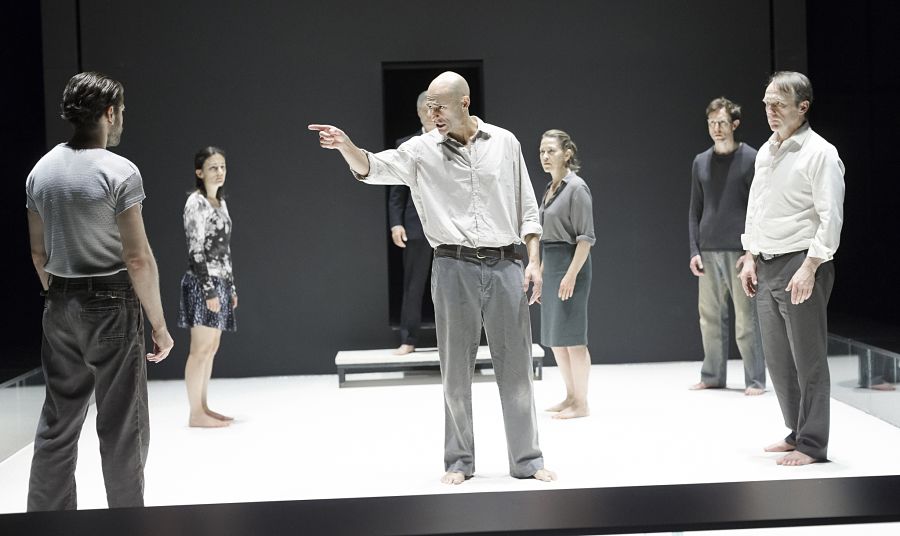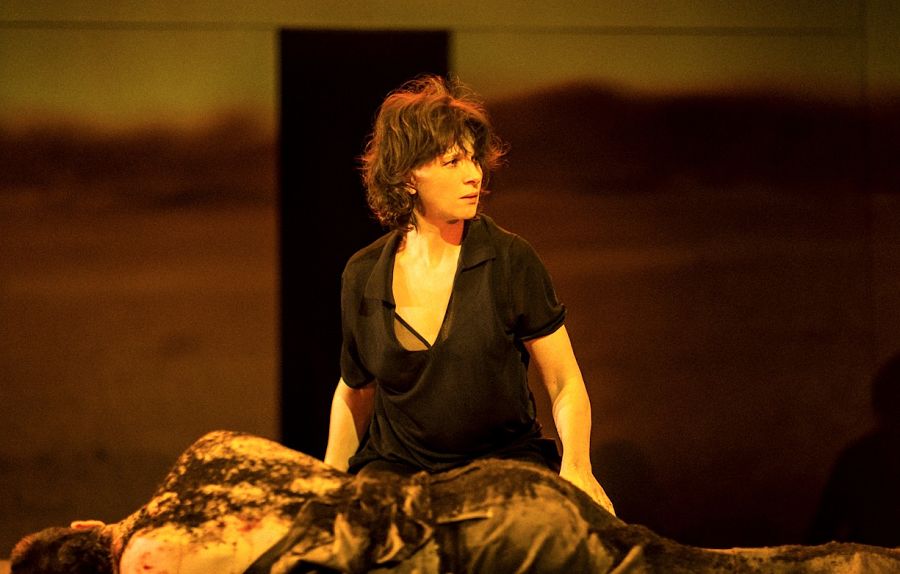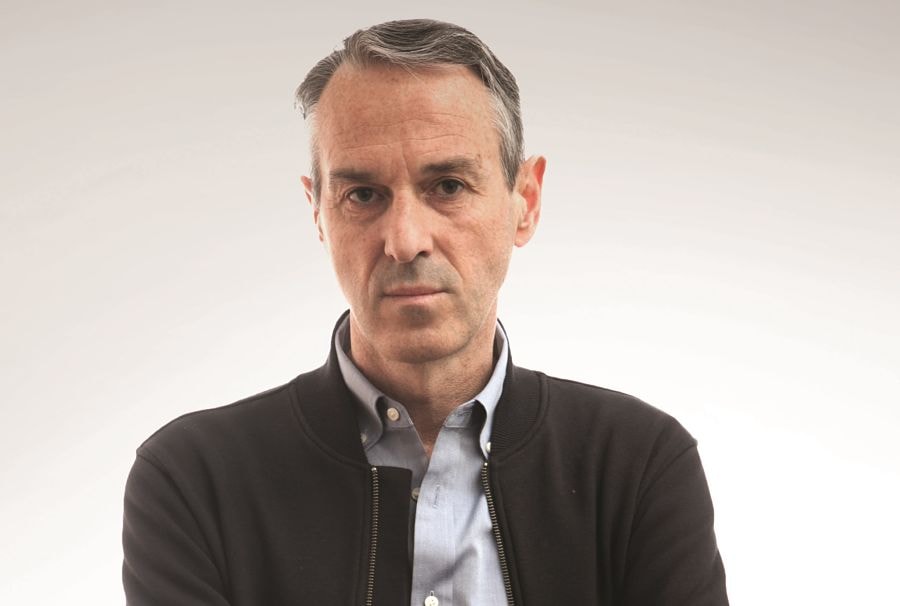New York is opening its arms to Belgian director Ivo van Hove. Although his avant-garde interpretations of classic works have been seen on the New York stage since 1997, mainly at New York Theatre Workshop and Brooklyn Academy of Music, there has never been a confluence quite like this one.
Van Hove’s London production of Sophocles’ Antigone, starring Juliette Binoche, finished a two-week run at BAM in October. Meanwhile, his pared-down, high-intensity take on Arthur Miller’s A View from the Bridge, a much-lauded transfer from the Young Vic in London’s West End, opens on Broadway on Thursday. And he is at the helm of Lazarus, a new musical collaboration between David Bowie and Irish playwright Enda Walsh, based on Walter Tevis’s 1963 book The Man Who Fell to Earth, which begins previews at New York Theatre Workshop on Nov. 18.
If those three high-profile productions weren’t enough, van Hove has got a Broadway revival of The Crucible, another Miller masterpiece, just around the bend. Slated to start previews in February, with a limited run through July, the production will feature an original score by Phillip Glass and a starry cast, including Ben Whishaw, Saorise Ronan, and recent Tony winner Sophie Okonedo.
So what’s behind van Hove’s new New York moment? “This is really a coincidence,” he insists. “It turned out to be like this, but it’s not like it was a deliberate choice…They were all offers I couldn’t refuse.”
View won three Olivier Awards, including best director, for its run at the Young Vic. Audiences were reportedly ravished by van Hove’s staging of the 1955 play, about a Red Hook family man who develops a destructive obsession with his wife’s niece. Van Hove calls his production of View “one of my best ever,” and notes that “in London, everybody that came to see it said they saw the play as if for the first time, as if they really discovered what it was about. So it must have been successful at getting to something they hadn’t seen yet.”
What was van Hove’s trick for making this oft-staged drama feel new again? (The last Broadway production of View was in 2010 and starred Liev Schreiber and Scarlett Johansson.)
“It sounds superficial to say it, but we did it by removing the naturalism,” he says. “I think naturalism is the biggest misunderstanding in theatre because there is nothing naturalistic onstage. Everything is artificial. So we removed that.”
When van Hove says “we,” he is referring to himself and Jan Versweyveld, his set designer and life partner of more than 35 years. In their many productions for Toneelgroep Amsterdam, where van Hove is general director, and their international work in Paris, London, Berlin, and elsewhere, they have become known for a kind of muscular, minimalist aesthetic. But van Hove insists that the reputation is misplaced.
“Did you see Roman Tragedies?” he asks. (That was his compression of three Shakespeare tragedies into one six-hour theatrical event, sans intermission.) “That was very maximal. And Lazarus will not be minimal either.”
In A View from the Bridge, at least, the actors are all barefoot and there is no set per se, just a demarcated area resembling a boxing ring. “There are no props,” van Hove adds. “But that was not my original intention. I had all the props ready next door—a roomful—and I said, ‘Whenever we need something, we’ll bring it out.’ We ended up with two props: a cigar and a chair.”
It may surprise some to find this stripped-down approach so well-suited to Miller, whose work usually gets the classic mid-century realist treatment, but van Hove thinks it aligns with the playwright’s genius.
“What Arthur Miller is very good at is taking a specific society, like Red Hook or Salem, and turning it into a society that becomes emblematic, a metaphor for the whole world,” van Hove explains. “And so I tried not to direct that particular society in their realistic circumstances. No spaghetti scenes. No Italian-American accents.” (The all-British cast has been instructed to do American accents but without any regional inflection.)
Van Hove has always been drawn to the classics, from Euripides to Shakespeare to O’Neill, finding in them universal themes that speak to the ages. But he is unapologetic about his desire to make them his own, whether that means putting ancient characters in modern dress, projecting atmospheric video, or underscoring the whole thing with the Velvet Underground (all of which he did in his recent Antigone).
“A director always has to reinvent a text for his age,” he says. “It doesn’t make sense to replicate it the way it was done 400 years ago, because that had a sense at that time for the people who came to see it. Reinventing the meaning of the text for today—that’s the thing.”
A recurring theme of his work has been the tragic hero: a flawed character with good intentions who moves unknowingly and inexorably toward their fate. With a different lexicon, Eddie Carbone could have come straight out of Shakespeare or Sophocles.
“I consider View a modern Greek tragedy, and Arthur Miller did, too,” says van Hove. “The Crucible also has that feeling of fate, of the thing that you think is not changeable.”

Antigone, likewise, has a misguided anti-hero at its center: Creon, the king of Thebes, who brings on the destruction of his entire family through his own unwillingness to bend. As with Eddie Carbone, Creon’s downfall seems the result of both his own weakness and of forces beyond his control.
“I consider him a leader with the right intentions,” van Hove says of Creon. “The family of Oedipus has created problems for society without solving the problems, and now we have to work together to solve them. That’s his intention. That’s a very political deed. But he immediately makes his first mistake.”
That would be his decision to pass a law, punishable by death, against burying Polynices, a traitor to the state and Antigone’s brother, whose body lies decaying in the open. When Antigone decides to bury him, “it is not for political reasons but for personal reasons,” van Hove explains. “It’s not a message to the world, but she just feels she has to do it. That’s what the play is deeply about. How can politics deal with these kinds of things? How can we position the world of emotions and of humanity within a society that has to be regulated?”
Another parallel between Miller and Sophocles suddenly strikes him: “When I think about it, it’s the same in The Crucible. There is this whole fight between the word of the law and the right human decisions to make.”
When Binoche and van Hove first met to discuss working together, he agreed to do Antigone, Binoche’s first choice, on one condition: “We have to have a good translation. And there’s only one person who can do that: Anne Carson.”
Canadian poet and classicist Carson was reluctant at first. She had recently written Antigonick, a nontraditional translation of the play complete with comic-book-style illustrations, and, according to van Hove, she feared she would be treading the same ground.
“Slowly, step by step, she was convinced, and then she did the most wonderful job in the world,” he says emphatically. “Her translation is very clear and poetic at the same time. A lot of the translations are only poetic or only clear, but hers is the perfect mix.”
Translations and adaptations are familiar territory for van Hove, including his own adaptations of several films for the stage. He generally shies away from new plays for fear that they won’t touch him the way the classics do.
“I’m always a little bit afraid of doing that, because I’m the kind of director that tries to make personal work,” he explains. “I want to do things that I deeply connect to, that I feel an urge to do, and I would find it very hard to suddenly get a text and think, ‘I just don’t get it,’ or ‘I don’t feel a lot about it,’ and then I have to do it. I couldn’t do it.”

So it says a lot that he signed on for Lazarus, a musical that Bowie has reportedly been thinking about doing for years, and for which van Hove was recruited last spring when Bowie and his co-writer Walsh decided that they wanted a director who was, as van Hove puts it, “a little more adventurous” than usual.
Bowie’s connection to the project goes back to 1976, when he starred in Nicolas Roeg’s film adaptation of Tevis’ book, immortalizing the character of Thomas Newton, an alien who comes to earth hoping to ferry precious resources back to his dying home planet. Instead he finds himself poked and prodded by the U.S. government, and his mission is undermined by the greed and cruelty of human beings.
When Bowie and Walsh, best known for a series of form-breaking plays (Penelope, The New Electric Ballroom) as as well as for writing the book for the Broadway musical Once, first approached him, van Hove was eager to work with them but too nervous to read the play. So instead they read it aloud to him.
Luckily, he “immediately connected to a lot of the themes in it,” and he was put at ease when they began to include him in the revision process. “We talked a lot and changed things,” van Hove says. “It was like a living body of work. So it really felt like a collaboration, and that was not what I had expected.”
How was it working with the legendary rock star, of whom van Hove had been a longtime admirer? “I was not a groupie,” he says, “but I was a fan. I used to go to his concerts in Brussels.” (He later raided the Bowie song catalogue for the soundtrack of his staging of Angels in America.)
“Immediately I felt that he was an artist,” says van Hove of working with Bowie. “He is a real artist, using music as his way of expressing what he thinks and feels about life. And I feel that even more now than I did before.”
Van Hove is cagey about the details of Lazarus, not wanting to give away too much about a theatrical event that has been so shrouded in mystery and so fiercely anticipated. (When tickets went on sale in mid-October, the entire run sold out in an hour and a half.) But he did reveal that the play is less an adaptation of the book than a sequel, picking up 30 years after the original story ends.
He also mentioned that Bowie’s music for the show is a combination of rearrangements of old songs (he wouldn’t say which ones) and a few new ones. “He was so inspired during the process that he said, ‘Oh, I’m going to write a new song here for this,’” recalls van Hove, adding that that was not Bowie’s original intention. The new music, van Hove says, “is great.”
Beyond that, he will only drop hints and leave the rest up to our powers of deduction.
“Well, of course the title is Lazarus, which is a religious, mythical story about resurrection, about someone who is dead coming alive by the help of God, but in this case, it’s not God,” van Hove says. Are we perhaps about to encounter a van Hove hero who doesn’t fall but instead rises?
As for his own rise, van Hove has no compunction about simultaneously working downtown with his old friends at New York Theatre Workshop and mounting his Broadway debut in midtown.
“Not to be adulterous,” he says, “but you can do different things in different circumstances, as long as there is an audience that wants to see it.” In what might be called an understatement, van Hove reflects, “There seems to be an audience for the theatre that we make.”


